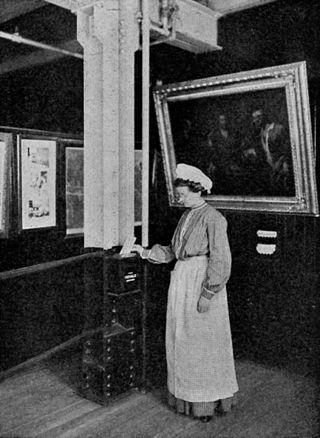Related Research Articles

The division of labour is the separation of the tasks in any economic system or organisation so that participants may specialise (specialisation). Individuals, organisations, and nations are endowed with or acquire specialised capabilities, and either form combinations or trade to take advantage of the capabilities of others in addition to their own. Specialised capabilities may include equipment or natural resources as well as skills. Training and combinations of equipment and other assets acting together are often important. For example, an individual may specialise by acquiring tools and the skills to use them effectively just as an organisation may specialise by acquiring specialised equipment and hiring or training skilled operators. The division of labour is the motive for trade and the source of economic interdependence.

Graphic design is a profession, academic discipline and applied art whose activity consists in projecting visual communications intended to transmit specific messages to social groups, with specific objectives. Graphic design is an interdisciplinary branch of design and of the fine arts. Its practice involves creativity, innovation and lateral thinking using manual or digital tools, where it is usual to use text and graphics to communicate visually.
Business is the practice of making one's living or making money by producing or buying and selling products. It is also "any activity or enterprise entered into for profit."
Employment is a relationship between two parties regulating the provision of paid labour services. Usually based on a contract, one party, the employer, which might be a corporation, a not-for-profit organization, a co-operative, or any other entity, pays the other, the employee, in return for carrying out assigned work. Employees work in return for wages, which can be paid on the basis of an hourly rate, by piecework or an annual salary, depending on the type of work an employee does, the prevailing conditions of the sector and the bargaining power between the parties. Employees in some sectors may receive gratuities, bonus payments or stock options. In some types of employment, employees may receive benefits in addition to payment. Benefits may include health insurance, housing, and disability insurance. Employment is typically governed by employment laws, organisation or legal contracts.

Underemployment is the underuse of a worker because their job does not use their skills, offers them too few hours, or leaves the worker idle. It is contrasted with unemployment, where a person lacks a job at all despite wanting one.

Temporary work or temporary employment refers to an employment situation where the working arrangement is limited to a certain period of time based on the needs of the employing organization. Temporary employees are sometimes called "contractual", "seasonal", "interim", "casual staff", "outsourcing", "freelance"; or the words may be shortened to "temps". In some instances, temporary, highly skilled professionals refer to themselves as consultants. Increasingly, executive-level positions are also filled with interim executives or fractional executives.
Freelance, freelancer, or freelance worker, are terms commonly used for a person who is self-employed and not necessarily committed to a particular employer long-term. Freelance workers are sometimes represented by a company or a temporary agency that resells freelance labor to clients; others work independently or use professional associations or websites to get work.
An independent contractor is a person, business, or corporation that provides goods or services under a written contract or a verbal agreement. Unlike employees, independent contractors do not work regularly for an employer but work as required, when they may be subject to law of agency. Independent contractors are usually paid on a freelance basis. Contractors often work through a limited company or franchise, which they themselves own, or may work through an umbrella company.

Piece work or piecework is any type of employment in which a worker is paid a fixed piece rate for each unit produced or action performed, regardless of time.
Amazon Mechanical Turk (MTurk) is a crowdsourcing website with which businesses can hire remotely located "crowdworkers" to perform discrete on-demand tasks that computers are currently unable to do as economically. It is operated under Amazon Web Services, and is owned by Amazon. Employers, known as requesters, post jobs known as Human Intelligence Tasks (HITs), such as identifying specific content in an image or video, writing product descriptions, or answering survey questions. Workers, colloquially known as Turkers or crowdworkers, browse among existing jobs and complete them in exchange for a fee set by the requester. To place jobs, requesters use an open application programming interface (API), or the more limited MTurk Requester site. As of April 2019, requesters could register from 49 approved countries.

The suggestion box is used for collecting slips of paper with input from customers and patrons of a particular organization. Suggestion boxes may also exist internally, within an organization, such as means for garnering employee opinion.

Crowdsourcing involves a large group of dispersed participants contributing or producing goods or services—including ideas, votes, micro-tasks, and finances—for payment or as volunteers. Contemporary crowdsourcing often involves digital platforms to attract and divide work between participants to achieve a cumulative result. Crowdsourcing is not limited to online activity, however, and there are various historical examples of crowdsourcing. The word crowdsourcing is a portmanteau of "crowd" and "outsourcing". In contrast to outsourcing, crowdsourcing usually involves less specific and more public groups of participants.
The digital economy is a portmanteau of digital computing and economy, and is an umbrella term that describes how traditional brick-and-mortar economic activities are being transformed by the Internet and World Wide Web technologies.

Coworking is an arrangement in which workers for different companies share an office space. It allows cost savings and convenience through the use of common infrastructures, such as equipment, utilities and receptionist and custodial services, and in some cases refreshments and parcel acceptance services. It is attractive to independent contractors, independent scientists, remote workers, digital nomads, and people who travel frequently. Additionally, coworking helps workers avoid the feeling of social isolation they may experience while remote working or traveling and eliminate distractions in home office. Most coworking spaces charge membership dues. Major companies that provide coworking space and serviced offices include WeWork, IWG plc, Industrious, and Impact Hub.
Freelancer is an Australian freelance marketplace website, which allows potential employers to post jobs that freelancers can then bid to complete. Founded in 2009, its headquarters is located in Sydney, Australia, though it also has offices in Vancouver, London, Buenos Aires, Manila, and Jakarta.
Microwork is a series of many small tasks which together comprise a large unified project, and it is completed by many people over the Internet. Microwork is considered the smallest unit of work in a virtual assembly line. It is most often used to describe tasks for which no efficient algorithm has been devised, and require human intelligence to complete reliably. The term was developed in 2008 by Leila Chirayath Janah of Samasource.
The sharing economy is a socio-economic system whereby consumers share in the creation, production, distribution, trade and consumption of goods, and services. These systems take a variety of forms, often leveraging information technology and the Internet, particularly digital platforms, to facilitate the distribution, sharing and reuse of excess capacity in goods and services.
A platform cooperative, or platform co-op, is a cooperatively owned, democratically governed business that establishes a two-sided market via a computing platform, website, mobile app or a protocol to facilitate the sale of goods and services. Platform cooperatives are an alternative to venture capital-funded platforms insofar as they are owned and governed by those who depend on them most—workers, users, and other relevant stakeholders.

Gig workers are independent contractors, online platform workers, contract firm workers, on-call workers, and temporary workers. Gig workers enter into formal agreements with on-demand companies to provide services to the company's clients.

Work or labour is the intentional activity people perform to support the needs and wants of themselves, others, or a wider community. In the context of economics, work can be viewed as the human activity that contributes towards the goods and services within an economy.
References
- 1 2 "The Disaggregated Worker" (PDF). Aptus Strategy Consulting. 2016.
- ↑ Chen, Daniel L. "The economics of crowdsourcing: a theory of disaggregated labor markets" (PDF). The National Bureau of Economic Research.
- ↑ Lewis-Kraus, Gideon (2019-02-21). "The rise of the working class". The New York Times Magazine.
- ↑ Rosenblat, Alex (2018). Uberland: How algorithms are rewriting the rules of work. p. 202.